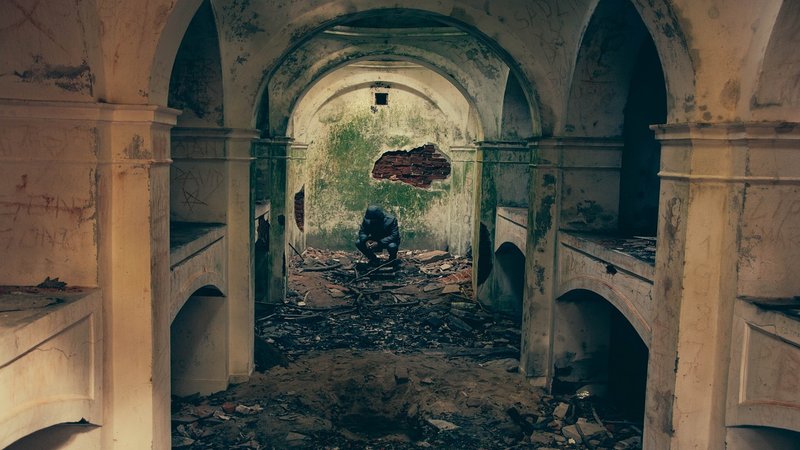It’s beginning to look a lot like Christmas. The stirrings of holiday cheer are all around us, from the Bing Crosby music loop at the Home Depot to the inflatable glowing Santas that every neighborhood seems to have.
But my Bible reading right now is anything but festive. I’m in Revelation, reading about Jesus the Warrior-King, returning to his creation to destroy his enemies with the sword.
Shouldn’t I take a break from the Apocalypse to highlight the little Lord Jesus asleep on the hay? Isn’t there something kind of, well, unseasonable about teaching, at this time of year, about a Christ who bears a sword and a cosmic entourage, who prepares his people a messianic banquet and then prepares for the birds a banquet of the flesh and blood of his enemies (Rev 19:17-19)? It is hard to imagine Tiny Tim exclaiming “God bless us every one” after hearing about southern-fried Gog and Magog.
The baby Jesus still exists in the American Christian subculture as a kind of non-threatening mascot for the holiday season. The only problem with this is that the Bible doesn’t present the baby Jesus as warm or sentimental at all.
But my discomfort only reveals to me how much my Christmas imagery is more shaped by Currier and Ives than by apostles and prophets.
The infant Jesus is not as conspicuous in American pop culture as he once was. Claymation Burl Ives is a little more palatable to contemporary religious pluralism. But the baby Jesus still exists in the American Christian subculture as a kind of non-threatening mascot for everything warm and sentimental about the holiday season. The only problem with this is that the Bible doesn’t present the baby Jesus as warm or sentimental at all. As a matter of fact, the sentimental Jesus of the Christmas season often chills our evangelistic fervor because we forget that the Bethlehem event is the exact opposite of blessing the good feelings of contemporary American culture.
The virgin birth prophesied in Isaiah is a sign, the prophet tells us, of God defeating his enemies and restoring his kingship (Isa 7:10-25). The young Galilean couple travel to Bethlehem, it must be remembered, because from that city of David will come a Conqueror who will drive back the Assyrians and shepherd the people of Israel (Micah 5:1-6). That’s why the angel tells Mary not just that she will bear a holy Child but that he will sit on the throne of his father David (Luke 1:32-33), a throne it must be remembered that came through the severed head and bloody foreskins of not a few Philistines. This is also why Herod didn’t greet the oracles of the Magi with a hearty “season’s greetings,” but with a bloody threat to root out this threat to his kingship (Matt 2). And all of this is rooted in an ancient promise that the son of the woman would crush the head of the serpent of Eden (Gen 3:15).
Remember: Jesus was not born into a gauzy, snowy “winter wonderland” of sweetly-singing angels and cute reindeer nuzzling one another at the side of his manger. He was born into a warzone. Jesus was chased out of his manger and into Egypt by one of Planned Parenthood’s ancestors, King Herod, who also sacrificed Bethlehem’s infant children for the sake of power.
We must remember that our love for family and friends and Christmas includes our responsibility to plead with them to be found in Christ before the great and terrible day of the Lord.
We must remember the infancy of Jesus. We must cherish in our hearts that he took on flesh and blood for us, that he bore our humanity in all of its fullness, even in the dependencies of a baby in a feeding box. But we must never allow this baby to be defined as non-threatening. Indeed, the shadow of Bethlehem threatens the frenzied buying of our consumeristic Christmas season. We must remember that ultimately we will not coo over him in a cradle beneath us, but give an account to him as our sovereign Judge and give glory to him as our sovereign King. We must remember that our love for family and friends and Christmas includes our responsibility to plead with them to be found in Christ before the great and terrible day of the Lord.
I suppose that’s why I won’t take a break from Revelation this season. The young virgin Mary, after all, set the tone for our Christmas thoughts when she reflected on the angel’s announcement of the birth of Jesus. She sang of God’s mercy to his people, of his faithfulness to his covenant promises. And then she sang also of the fact that in this fetal Incarnate One within her God “has shown strength with his arm; he has scattered the proud in the thoughts of their hearts; he has brought down the mighty from their thrones, and exalted those of humble estate; he has filled the hungry with good things, and the rich he has sent empty away” (Luke 1:51-53 ESV).
With Bethlehem before her, Mary also had Armageddon on her mind. So should we.
Editor’s Note: This post originally ran in December 2005.








